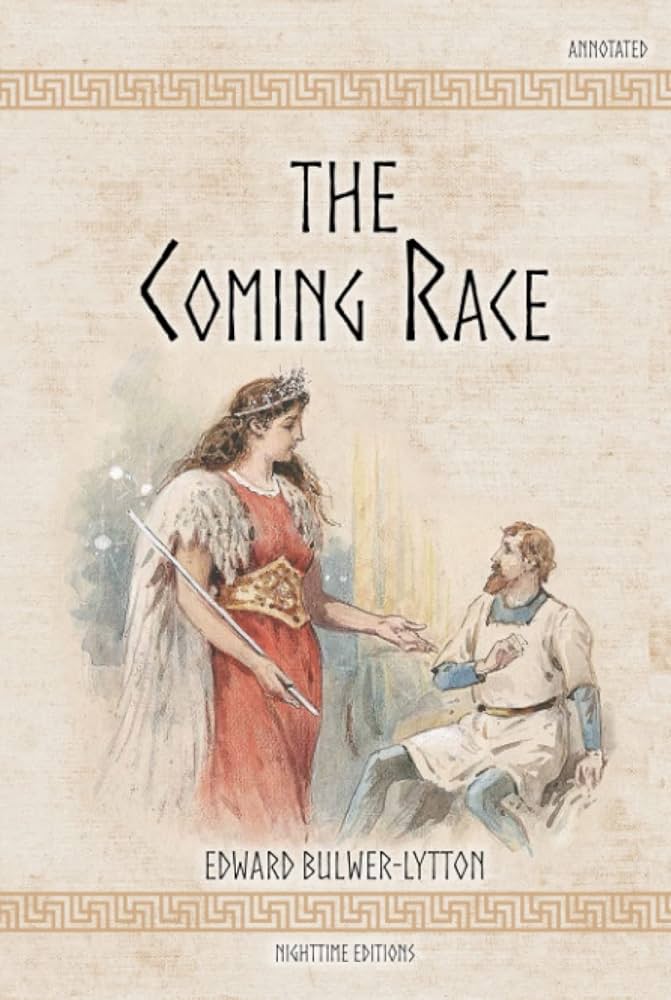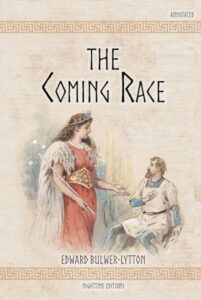Chapter XXVI — The coming Race
byChapter XXVI opens with a shift in tone as the narrator, once filled with awe, now feels an unsettling gloom that shadows every thought. His recent interaction with Zee has left him deeply reflective, not about romance, but about survival. Though the Vril-ya live in a realm of remarkable beauty and tranquility, their power hangs above him like a quiet threat. They do not intend cruelty, yet their abilities make resistance irrelevant. He realizes that kindness does not guarantee safety when authority comes without limits. The peace around him feels imposed, not chosen.
His admiration for their society gradually gives way to a yearning for his own imperfect world. On the surface, war, inequality, and suffering persist, but at least they offer emotional depth and shared struggle. In contrast, the Vril-ya live in a sterilized utopia that has removed not just pain, but passion. Every task is performed by machines, every need pre-calculated and met. There is no discontent, but also no surprise. What once seemed ideal now feels inhuman. The narrator begins to question whether perfection, when forced, can ever feel like freedom.
There is no working class among them, nor is there rebellion. Labor has been replaced with quiet efficiency. Their technological progress has eliminated toil but also removed the energy of ambition. No one strives, because there is no need to. This creates a society of comfort but also of emotional stillness. With health sustained and disease forgotten, even mortality loses meaning. Longevity is common, but vibrancy is rare. The people do not struggle, and in that absence, something vital seems lost. The narrator mourns what he cannot find—a raw, imperfect sense of life.
The role of women among the Vril-ya further deepens his sense of cultural disorientation. Their physical strength, intellectual dominance, and mastery of Vril make them more commanding than their male counterparts. Rather than being subdued or submissive, they are the ones who choose partners and decide the course of relationships. This reversal challenges everything the narrator has known. Yet, strangely, it does not breed conflict. Once bonded, these women become nurturing and devoted companions. It is not submission, but a chosen softness that follows their initial strength. The narrator finds this dynamic alien, yet oddly touching.
Religion in this world lacks the divisions that define his own. The Vril-ya believe in one benevolent power and an enduring soul beyond death. Their faith is not bound by rituals or dogma, but by unity. They do not argue over sacred texts or splinter into sects. Instead, belief is shared quietly, almost scientifically. This spiritual simplicity serves as a glue to their community. Without conflict over doctrine, they preserve peace. The narrator envies this harmony but wonders if such belief, stripped of mystery and metaphor, can still inspire.
He then considers whether such a society could accept outsiders. The idea seems laughable. Humans from the surface, bred in competition, desire, and division, would not blend smoothly with the Vril-ya’s calm. Achievement means little here. Individualism is subdued in favor of balance. The very ambition that fuels surface civilization would appear chaotic, even dangerous, in this world. A peaceful merging seems impossible—not out of malice, but from sheer incompatibility. The thought depresses him.
Finally, he reflects on a darker possibility—the Vril-ya might one day emerge. Should they choose to ascend, their impact would be immediate and likely irreversible. With their superior knowledge and power, they would not need to conquer violently. Resistance would be brief. Entire societies could be reshaped or erased. History has shown how advanced civilizations treat those they deem lesser. The narrator draws chilling comparisons to colonial expansions of the past. In such a scenario, humanity might not be enslaved—but simply removed.
His imagination conjures no hopeful outcome. Intermarriage and shared governance seem naive fantasies. The balance would always tilt toward the Vril-ya. They might not want war, but neither would they tolerate disorder. The surface world, built on messy freedoms and loud desires, would be too much for them to endure. And so, the narrator concludes, it may be best that the two civilizations remain apart. The seal that separates them now may be the final mercy we are granted.
Even in its most benevolent form, power creates distance. The Vril-ya, by eliminating weakness, have also made empathy difficult. Their world is beautiful, but cold. The narrator sees that what defines humanity may not be progress, but the willingness to live through struggle. Perfection can numb where imperfection teaches. As he sits once more in silence, he no longer wishes to belong to their world. He only hopes to return to his own.


